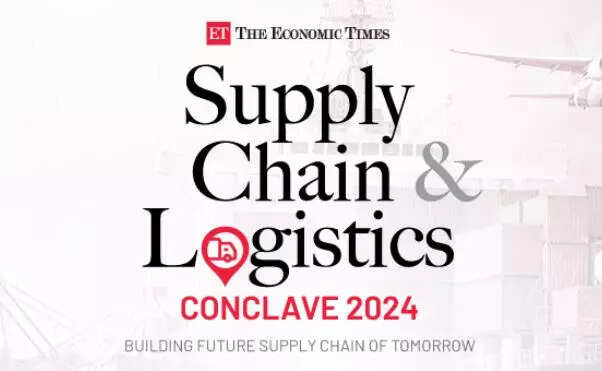
New Delhi: The 4th edition of the Economic Times Supply Chain & Logistics Conclave 2024 concluded successfully at the Hyatt Regency, New Delhi, bringing together over 200 senior executives, policymakers, and industry leaders. This important event focused on the future of India’s logistics sector and highlighted the crucial role of innovation and technology in driving the nation’s economic growth and global competitiveness.
The conclave featured over seven sessions and more than 30 distinguished speakers who shared their insights on topics ranging from sustainable urban deliveries to the digital supply chain as the building blocks of the future. The event emphasised the importance of reducing logistics and supply chain costs, enhancing global competitiveness, and positioning India as the next big global logistics hub.
Key highlights from the ETSCL conclave:
Phaneesh Prakash, Business Head, Porter, remarked on the evolving demands of customers, stating, “The customers are spoilt for choice, they want everything delivered instantly.”
Kishore Jayaraman OBE, President – India & South, Rolls-Royce, emphasized the importance of skilling in the industry: “We have the capability, we are filling the gap between skilling and education.”
Ramesh Kumar Verma, Deputy Secretary, DPIIT, Logistics division, highlighted India’s strategic position in global supply chains: “India is a perfect place to shift global supply chain from neighboring countries and other areas.”
Umesh Madhyan, President – Logistics, Hindustan Coca Cola Beverages, shared insights on warehousing, stating, “Warehouse is now a cost addition, and not a value addition.”
Himanshu Gupta, Associate Director – Supply Planning and Logistics, Africa, Middle East and South Asia, PepsiCo, noted India’s flexibility in transportation: “India has flexibility in terms of transportation for outbound logistics, compared to many developed countries.”
Piyush Aggarwal, Head Supply Chain, Jubliant Agri and Consumer Products Limited, urged for transparency in sustainable practices: “Customers should be aware of which companies are using sustainable measures so that they can make a sustainable choice.”
Jeyanth Samuel Ranjan, Director – Product, Business Intel & Central Operations, APAC MENA & LATAM, Amazon, said, “The foundations of the way we have been doing business haven’t changed in the past five years. It’s important to engage people meaningfully in the business, and the business must ensure that everybody wins in the process—whether it’s our partners, associates, customers, sellers, or anyone who is part of the supply chain. That’s how we build a large, sustainable business.”
Sukumar Kameswaran, CEO, TVS Supply Chain Solutions, pointed out the challenges in green mobility: “Green mobility is mostly fitted to last mile mobility, long haul infrastructure is still under-developed.”
Avinash Dhagat, SVP, Supply Chain, Honasa Consumer Limited, stressed the importance of sustainability: “From a supply chain perspective, there are a lot of opportunities to make our operations more sustainable. Any small change, say for example, in packaging material, can make a huge impact in making the supply chain more sustainable.”
Vipin Sharda, Head of Customer Supply Chain, Nestle South Asia Region, expressed optimism about India’s manufacturing potential: “India can be a manufacturing base for the world. This is the best time to be in supply chain in India.”
Mohit Rathi, VP – Customer Growth & Engagement, Porter, highlighted the key factors behind success: “The key reasons for our success have been the network and user obsession.”
Namit Jain, Founder & CEO, Zen Mobility, addressed the challenges of last-mile deliveries: “Last-mile deliveries are the most cost-consuming process, they constitute 50% of the total cost.”
Jaya Rohra, Global SAAS Sales Leader, ElasticRun, spoke about the uniqueness of Indian supply chains: “Indian Supply Chain is different from the rest of the world. People need to be empowered through technology.”
A Gururaj, MD, Optiemus Electronics, emphasized the potential of supply chains in healthcare: “We have to use supply chain more and more in the medical field in order to save lives.”
Manoranjan Kumar, Chief Ports Officer, Arcelor Mittal Nippon Steel, called for better regulatory frameworks: “We need good intentioned, evidence-based judicial architecture to facilitate ease of business better.”
Akash Gupta, Co-Founder & CEO, Zypp Electric, underscored the role of technology in business growth: “You cannot build a business without technology today if you want to scale.”
Sanjeev Madavi, Chief Innovation Officer, Kale Logistics, described the importance of data in supply chain management: “The data exchanged is the ‘glue’ that holds the control towers together.”
Sanjay Batra, Head Industrial Business India, ASSA ABLOY Entrance Systems, raised awareness on safety in logistics: “In the US, 6000 forklift accidents occur when a lift truck is driven off a loading dock.”
Anil Syal, President – Safexpress, shared insights on last-mile delivery: “Route optimization does not necessarily require a very high-end tech support, especially for last-mile delivery.”
Ayush Lohia, CEO, Lohia Auto, discussed payload concerns: “Payload has never been a question when we talk about L3 and L5, it’s only the volume that is the concern.”
Another major highlight of the event was the announcement of the West Chapter of the Supply Chain & Logistics Conclave, scheduled to be held in Mumbai in March 2025. This upcoming event will continue the discussions on the evolution of India’s logistics sector.
The event was a resounding success, providing a platform for industry leaders to share their knowledge and engage in strategic discussions that will shape the future of India’s supply chain and logistics sector. The conclave reinforced the critical need for a more sustainable and efficient logistics system and set the stage for continued innovation and growth in the sector.

